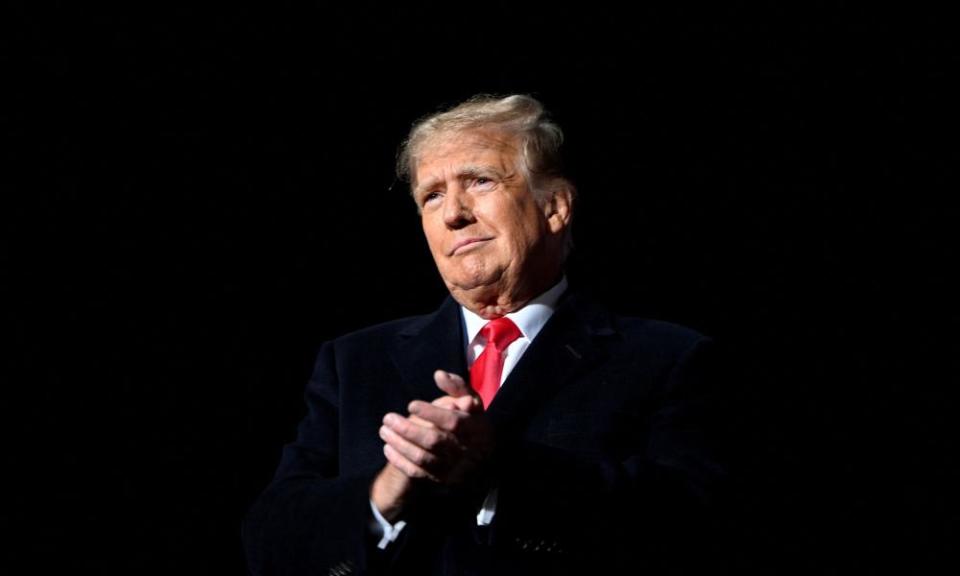Trump Organization guilty of tax fraud, New York jury finds

A jury in New York has convicted the Trump Organization of criminal tax fraud in a stinging rebuke of the former US president’s company.
Although Donald Trump was not personally on trial, prosecutors in the case brought by the Manhattan district attorney insisted he was fully aware of the long-running scheme in which they said executives were enriched by off-the-books perks to make up for lower salaries, reducing the company’s tax liabilities.
Related: Trump Pac reportedly paid legal bills of Mar-a-Lago witnesses
“This was a case about greed and cheating,” Alvin Bragg, the Manhattan district attorney, said in a statement celebrating the guilty verdict. “In Manhattan, no corporation is above the law.”
The 12-person jury in New York’s state court was sent out to deliberate on Monday morning after a six-week trial in which Trump Organization lawyers pinned blame for the fraud solely on the greed of longtime chief financial officer Allen Weisselberg.
Trump, who recently launched his 2024 campaign, assailed the investigation as part of a politically motivated “witch hunt”. In a statement on Tuesday, the Trump Organization denounced the verdict, which could carry a fine of up to $1.6m, a relatively negligible sum for such a large company though it could affect future business dealings. A lawyer for the Trump Organization vowed to appeal.
“The notion that a company could be held responsible for an employee’s actions, to benefit themselves, on their own personal tax returns is simply preposterous,” the company said in a statement.
Weisselberg, the former close ally of Trump accepted a plea deal earlier this year admitting fraud in exchange for a five-month prison sentence. Prosecutors laid out a case heavily reliant on Weisselberg’s testimony.
The verdict represents a serious blow to Trump and his family who rose to fame as property moguls in New York but whose business practices have long shadowed in secrecy with rumors of ill-doing.
It is also the latest in a raft of legal troubles that surround Trump, including several investigations related to his attempts to overturn the 2020 election victory of Joe Biden and his apparent removal of sensitive White House documents to his Florida resort of Mar-a-Lago.
The monthlong trial featured testimony from seven witnesses, including Weisselberg, one of Trump’s most loyal lieutenants, and senior vice-president and controller Jeffrey McConney. An outside accountant who spent years preparing tax returns for Trump and the company also testified. In their closing statement to the jury, prosecutors alleged that Trump had “explicitly sanctioned tax fraud”.
During their deliberations, jurors had zeroed in on the last count listed on the verdict sheet: falsifying business records. Jurors sent notes twice Tuesday asking for clarity on the falsifying business records charge and a reading of related testimony.
Weisselberg testified that he ordered accounts payable supervisor Deborah Tarasoff to delete “per Allen Weisselberg” notations from entries in Trump’s personal general ledger reflecting that Trump personally paid private school tuition for Weisselberg’s grandchildren.
First, jurors asked the judge to reread the charge and the elements they are required to find for a guilty verdict. Later, they asked to again hear Tarasoff’s testimony. Tarasoff, a Trump Organization veteran, testified that Weisselberg called her into his office and told her, “Go in and take my name off it” in September 2016.
After resuming deliberations Tuesday, jurors sent a note asking the judge to reread three counts of falsifying business records pertaining to the creation of false W2 tax forms for Weisselberg for 2015, 2016 and 2017.
The case does not bring to a close the legal challenges facing Trump and his businesses – far from it. Bragg has said that a related investigation he inherited from his predecessor, district attorney Cyrus Vance Jr, is “ongoing”. In that case, investigators are reportedly focused on assessing the integrity of the Trump Organization’s financial statements.
And earlier this year, the New York state attorney general, Letitia James, brought a sweeping civil suit against the former president, three of his adult children and the Trump Organization after a lengthy investigation by her office. That suit, which is still pending, accuses Trump and his children of “staggering” fraud, alleging that they provided fraudulent statements to lenders and insurers that wildly inflated the value of his real estate holdings.
In a statement, James commended Bragg and his team for their successful prosecution of the former president’s company. “We can have no tolerance for individuals or organizations that violate our laws to line their pockets,” she said, adding: “This verdict sends a clear message that no one and no organization is above our laws.”
The legal woes have to a large extent over-shadowed Trump’s recent announcement of his new White House run.
Though Trump’s campaign was launched with great fanfare from Mar-a-Lago, it has not set the political world alight after high profile Trump-backed candidates were largely defeated in November’s midterm elections.
Numerous rivals to Trump are now starting to emerge in the Republican party, especially Florida governor Ron DeSantis.

 money
money 